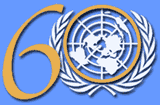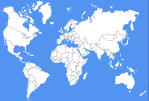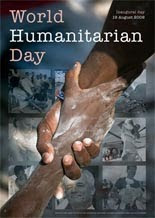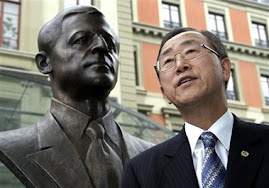dPress release
18 December 2008
The 9th International Migrants Day coincides with the 60th anniversary of the adoption of the Universal Declaration of Human Rights (UDHR). Many UDHR provisions vividly relate to some of the threats – racism, xenophobia, labour and sexual exploitation, arbitrary detention and other injustices- and hopes – freedom of movement, right to work, to education, to live in dignity - experienced by millions of women, men and children and demonstrate that migrants rights are human rights. This year also marks the 5th year of the entry into force of the International Convention on the Protection of the Rights of All Migrant Workers and Members of their Families. The decades-long gap in the adoption of a treaty and other human rights tools for the protection of migrant workers is about to have particularly dire consequences. For scores of migrants, the world financial crisis will expose their existing vulnerability to stronger hardship and exploitation. It will also result in diminished remittances to those left behind in their home countries. Ironically, while migrants have often been the invisible architects of many striving economies and least benefited from financial investment and related wealth generating products, they will be amongst the worst hit. It is thus essential that civil society actively monitors respect for the Convention, engages with the UN Committee on Migrant Workers and renews the call for universal ratification. But, the fact that major countries of destination did not ratify this convention does not mean that they should not / and cannot be held accountable. Other international instruments do apply to migrant workers and it is up to migrants’ organisations, civil society and the international community to make use of them. (See December 18’s newest publication, “the Samizdat”.) More than ever, International Migration Day (IMD) is an occasion for international solidarity and for making migrants voices heard. December 18 gives a platform to these testimonies via Radio 1812, a global event that brings together a wide range of radio stations that broadcast special programmes on the occasion of IMD. This unique radio marathon enables migrants’ voices to be heard, not only on community-based radio stations but also on large public broadcasts and via our dedicated website. More than 100 radio stations from over 35 countries will participate in this year’s event. December 18 believes that it is wrong to deal with migration as a security issue only. Many governments want to stay out of the limelight and orchestrate policy discussions, for instance within the Global Forum on Migration and Development conveyed outside of the United Nations thereby excluding civil society from the process. Civil society, including NGOs and migrant organisations often are the sole actors delivering assistance and advice to migrants in countries of origin, transit and arrival. Their unique experience would greatly enrich analyses and solutions oriented discussions respectful of a human rights framework. However, the UDHR and other human rights norms and standards evolved since then and have slowly been integrated in some international, regional and national government responses to migration, including, albeit timidly, in some migration management initiatives. More than ever, civil society, migrant and human rights organisations will need to remind governments of their commitments and highlight the relevance of the Preamble of the UDHR which declares that: “[…] recognition of the inherent dignity and of the equal and inalienable rights of all members of the human family is the foundation of freedom, justice and peace in the world, […] disregard and contempt for human rights have resulted in barbarous acts which have outraged the conscience of mankind, and the advent of a world in which human beings shall enjoy freedom of speech and belief and freedom from fear and want has been proclaimed as the highest aspiration of the common people, […] it is essential, if man is not to be compelled to have recourse, as a last resort, to rebellion against tyranny and oppression, that human rights should be protected by the rule of law, […] it is essential to promote the development of friendly relations between nations.” December continues to work for the respect of the human dignity and the fundamental human rights of all migrant workers and their families.-->
Learn more about International Migrants Day.
Link,http://www.hrea.org/index.php?base_id=2&language_id=1&headline_id=8409, consultado a 18 de Dezembro de 2008.
18 December 2008
The 9th International Migrants Day coincides with the 60th anniversary of the adoption of the Universal Declaration of Human Rights (UDHR). Many UDHR provisions vividly relate to some of the threats – racism, xenophobia, labour and sexual exploitation, arbitrary detention and other injustices- and hopes – freedom of movement, right to work, to education, to live in dignity - experienced by millions of women, men and children and demonstrate that migrants rights are human rights. This year also marks the 5th year of the entry into force of the International Convention on the Protection of the Rights of All Migrant Workers and Members of their Families. The decades-long gap in the adoption of a treaty and other human rights tools for the protection of migrant workers is about to have particularly dire consequences. For scores of migrants, the world financial crisis will expose their existing vulnerability to stronger hardship and exploitation. It will also result in diminished remittances to those left behind in their home countries. Ironically, while migrants have often been the invisible architects of many striving economies and least benefited from financial investment and related wealth generating products, they will be amongst the worst hit. It is thus essential that civil society actively monitors respect for the Convention, engages with the UN Committee on Migrant Workers and renews the call for universal ratification. But, the fact that major countries of destination did not ratify this convention does not mean that they should not / and cannot be held accountable. Other international instruments do apply to migrant workers and it is up to migrants’ organisations, civil society and the international community to make use of them. (See December 18’s newest publication, “the Samizdat”.) More than ever, International Migration Day (IMD) is an occasion for international solidarity and for making migrants voices heard. December 18 gives a platform to these testimonies via Radio 1812, a global event that brings together a wide range of radio stations that broadcast special programmes on the occasion of IMD. This unique radio marathon enables migrants’ voices to be heard, not only on community-based radio stations but also on large public broadcasts and via our dedicated website. More than 100 radio stations from over 35 countries will participate in this year’s event. December 18 believes that it is wrong to deal with migration as a security issue only. Many governments want to stay out of the limelight and orchestrate policy discussions, for instance within the Global Forum on Migration and Development conveyed outside of the United Nations thereby excluding civil society from the process. Civil society, including NGOs and migrant organisations often are the sole actors delivering assistance and advice to migrants in countries of origin, transit and arrival. Their unique experience would greatly enrich analyses and solutions oriented discussions respectful of a human rights framework. However, the UDHR and other human rights norms and standards evolved since then and have slowly been integrated in some international, regional and national government responses to migration, including, albeit timidly, in some migration management initiatives. More than ever, civil society, migrant and human rights organisations will need to remind governments of their commitments and highlight the relevance of the Preamble of the UDHR which declares that: “[…] recognition of the inherent dignity and of the equal and inalienable rights of all members of the human family is the foundation of freedom, justice and peace in the world, […] disregard and contempt for human rights have resulted in barbarous acts which have outraged the conscience of mankind, and the advent of a world in which human beings shall enjoy freedom of speech and belief and freedom from fear and want has been proclaimed as the highest aspiration of the common people, […] it is essential, if man is not to be compelled to have recourse, as a last resort, to rebellion against tyranny and oppression, that human rights should be protected by the rule of law, […] it is essential to promote the development of friendly relations between nations.” December continues to work for the respect of the human dignity and the fundamental human rights of all migrant workers and their families.-->
Learn more about International Migrants Day.
Link,http://www.hrea.org/index.php?base_id=2&language_id=1&headline_id=8409, consultado a 18 de Dezembro de 2008.






 Former UN United Nations Secretary General Kofi Annan delivers his message during the first Memorial Lecture of the Sergio Vieira de Mello Foundation at the International Conference Centre Geneva (CICG) in Geneva, Switzerland, Monday, March 17, 2008.
Former UN United Nations Secretary General Kofi Annan delivers his message during the first Memorial Lecture of the Sergio Vieira de Mello Foundation at the International Conference Centre Geneva (CICG) in Geneva, Switzerland, Monday, March 17, 2008. 



